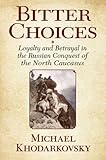Bitter choices : loyalty and betrayal in the Russian conquest of the North Caucasus / Michael Khodarkovsky.
Material type: TextPublication details: Ithaca : Cornell University Press, (c)2011.Description: 1 online resource (xii, 200 pages) : illustrations, mapsContent type:
TextPublication details: Ithaca : Cornell University Press, (c)2011.Description: 1 online resource (xii, 200 pages) : illustrations, mapsContent type: - text
- computer
- online resource
- 9780801462894
- DK511 .B588 2011
- COPYRIGHT NOT covered - Click this link to request copyright permission: https://lib.ciu.edu/copyright-request-form
| Item type | Current library | Collection | Call number | URL | Status | Date due | Barcode | |
|---|---|---|---|---|---|---|---|---|
 Online Book (LOGIN USING YOUR MY CIU LOGIN AND PASSWORD)
Online Book (LOGIN USING YOUR MY CIU LOGIN AND PASSWORD)
|
G. Allen Fleece Library ONLINE | Non-fiction | DK511.2 (Browse shelf(Opens below)) | Link to resource | Available | ocn763161315 |
Includes bibliographies and index.
The frontiers of the North Caucasus -- Atarshchikov's childhood -- Journey through the northeast Caucasus -- Inside Ermolov's "iron fist" -- St. Petersburg and Poland -- Return to the North Caucasus -- Interpreter and administrator -- Russian policies and alternatives -- The first desertion -- From Semën Atarshchikov to Hajret Muhammed.
This book tells the story of a single man with multiple allegiances and provides a concise and compelling history of the mountainous region between the Black and Caspian seas. After forays beginning in the late 1500s, Russia tenuously conquered the peoples of the region in the 1850s; the campaign was defined by a cruelty on both sides that established a pattern repeated in our own time, particularly in Chechnya. At the center of Khodarkovsky's sweeping account is Semen Atarshchikov. His father was a Chechen translator in the Russian army, and Atarshchikov grew up with roots in both Russian and Chechen cultures. His facility with local languages earned him quick promotion in the Russian army. Atarshchikov enjoyed the confidence of his superiors, yet he saw the violence that the Russians inflicted on the native population and was torn between his duties as a Russian officer and his affinity with the highlanders. Twice he deserted the army to join the highlanders in raids against his former colleagues. In the end he was betrayed by a compatriot who sought to gain favor with the Russians by killing the infamous Atarshchikov. we learn a great deal about the region's geography, its peoples, their history, and their conflicts with both the Russians and one another. Khodarkovsky reveals disputes among the Russian commanders and the policies they advocated; some argued for humane approaches but always lost out to those who preferred more violent means. Like Hadji Murat--the hero of Tolstoy's last great work--Atarshchikov moved back and forth between Russian and local allegiances; his biography is the story of the North Caucasus, one as relevant today as in the nineteenth century.
COPYRIGHT NOT covered - Click this link to request copyright permission:
There are no comments on this title.
